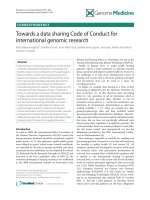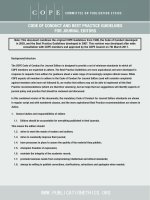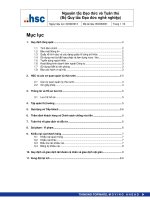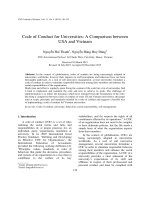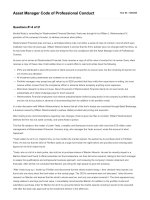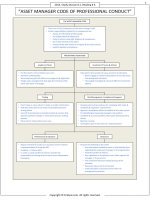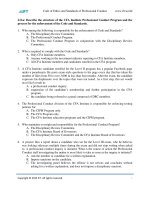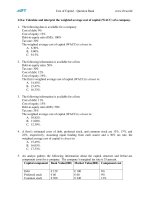CFA 2018 r04 asset manager code of conduct slides
Bạn đang xem bản rút gọn của tài liệu. Xem và tải ngay bản đầy đủ của tài liệu tại đây (617.72 KB, 16 trang )
Level III - Ethical and Professional Standards in
Practice
Asset Manager Code of Professional Conduct
www.ift.world
Graphs, charts, tables, examples, and figures are copyright 2014, CFA Institute.
Reproduced and republished with permission from CFA Institute. All rights reserved.
Contents
• Introduction
• General Principles of Conduct
• Asset Manager Code of Professional Conduct
Appendix – Recommendations and Guidance
www.ift.world
2
Introduction
• The Asset Manager Code of Professional Conduct outlines the ethical and
professional responsibilities of firms (“managers”) that manage assets on behalf of
clients.
• The goal of this Code is to set forth a useful framework for all asset managers to
provide services in a fair and professional manner and to fully disclose key
elements of those services to clients.
• To be implemented effectively, the principles and standards embodied in the Code
must be supported by appropriate compliance procedures.
• Clients must be able to count on full and fair disclosure from their Managers.
www.ift.world
3
Adopting the Code and Claiming Compliance
• Firms adopting the code have to be in full compliance. Partial compliance or
statements of exception are prohibited.
• Adoption of or compliance with the Code does not require a firm to amend its
existing code of ethics or other policies and procedures as long as they are at least
consistent with the principles and provisions set forth in the Code.
• “[Insert name of Firm] claims compliance with the CFA Institute Asset Manager
Code of Professional Conduct. This claim has not been verified by CFA Institute.”
www.ift.world
4
General Principles of Conduct
1. Act in a professional and ethical manner at all times.
2. Act for the benefit of clients.
3. Act with independence and objectivity.
4. Act with skill, competence, and diligence.
5. Communicate with clients in a timely and accurate manner.
6. Uphold the applicable rules governing capital markets.
www.ift.world
5
Asset Manager Code of Professional Conduct
A. Loyalty to Clients
B. Investment Process and Actions
C. Trading
D. Risk Management, Compliance, and Support
E. Performance and Valuation
F. Disclosures
www.ift.world
6
A. Loyalty to Clients
Managers Must:
1. Place client interests before their own.
2. Preserve the confidentiality of information communicated by clients within the
scope of the Manager–client relationship.
3. Refuse to participate in any business relationship or accept any gift that could
reasonably be expected to affect their independence, objectivity, or loyalty to
clients.
www.ift.world
7
B. Investment Process and Actions
Managers Must:
1. Use reasonable care and prudent judgment when managing client assets.
2. Not engage in practices designed to distort prices or artificially inflate trading
volume with the intent to mislead market participants.
3. Deal fairly and objectively with all clients when providing investment information,
making investment recommendations, or taking investment action.
4. Have a reasonable and adequate basis for investment decisions.
www.ift.world
8
B. Investment Process and Actions
Managers Must:
5. When managing a portfolio or pooled fund according to a specific mandate,
strategy, or style:
–
–
Take only investment actions that are consistent with the stated objectives and constraints of
that portfolio or fund.
Provide adequate disclosures and information so investors can consider whether any proposed
changes in the investment style or strategy meet their investment needs.
6. When managing separate accounts and before providing investment advice or
taking investment action on behalf of the client:
–
–
Evaluate and understand the client’s investment objectives, tolerance for risk, time horizon,
liquidity needs, financial constraints, any unique circumstances (including tax considerations,
legal or regulatory constraints, etc.) and any other relevant information that would affect
investment policy.
Determine that an investment is suitable to a client’s financial situation.
www.ift.world
9
C. Trading
Managers Must:
1. Not act or cause others to act on material nonpublic information that could affect
the value of a publicly traded investment.
2. Give priority to investments made on behalf of the client over those that benefit
the Managers’ own interests.
3. Use commissions generated from client trades to pay for only investment-related
products or services that directly assist the Manager in its investment decision
making process, and not in the management of the firm.
4. Maximize client portfolio value by seeking best execution for all client
transactions.
5. Establish policies to ensure fair and equitable trade allocation among client
accounts.
www.ift.world
10
D. Risk Management, Compliance, and Support
Managers Must:
1. Develop and maintain policies and procedures to ensure that their activities
comply with the provisions of this Code and all applicable legal and regulatory
requirements.
2. Appoint a compliance officer responsible for administering the policies and
procedures and for investigating complaints regarding the conduct of the Manager
or its personnel.
3. Ensure that portfolio information provided to clients by the Manager is accurate
and complete and arrange for independent third-party confirmation or review of
such information.
4. Maintain records for an appropriate period of time in an easily accessible format.
www.ift.world
11
D. Risk Management, Compliance, and Support
Managers Must:
5. Employ qualified staff and sufficient human and technological resources to
thoroughly investigate, analyze, implement, and monitor investment decisions and
actions.
6. Establish a business-continuity plan to address disaster recovery or periodic
disruptions of the financial markets.
7. Establish a firmwide risk management process that identifies, measures, and
manages the risk position of the Manager and its investments, including the
sources, nature, and degree of risk exposure.
www.ift.world
12
E. Performance and Valuation
Managers Must:
1. Present performance information that is fair, accurate, relevant, timely, and
complete. Managers must not misrepresent the performance of individual
portfolios or of their firm.
2. Use fair-market prices to value client holdings and apply, in good faith, methods to
determine the fair value of any securities for which no independent, third- party
market quotation is readily available.
www.ift.world
13
F. Disclosures
Managers Must:
1. Communicate with clients on an ongoing and timely basis.
2. Ensure that disclosures are truthful, accurate, complete, and understandable and
are presented in a format that communicates the information effectively.
3. Include any material facts when making disclosures or providing information to
clients regarding themselves, their personnel, investments, or the investment
process.
www.ift.world
14
F. Disclosures
4. Disclose the following:
a) Conflicts of interests generated by any relationships with brokers or other entities, other client accounts, fee
structures, or other matters.
b) Regulatory or disciplinary action taken against the Manager or its personnel related to professional conduct.
c) The investment process, including information regarding lock-up periods, strategies, risk factors, and use of
derivatives and leverage.
d) Management fees and other investment costs charged to investors, including what costs are included in the
fees and the methodologies for determining fees and costs.
e) The amount of any soft or bundled commissions, the goods and/or services received in return, and how those
goods and/or services benefit the client.
f) The performance of clients’ investments on a regular and timely basis.
g) Valuation methods used to make investment decisions and value client holdings.
h) Shareholder voting policies.
i) Trade allocation policies.
j) Results of the review or audit of the fund or account.
k) Significant personnel or organizational changes that have occurred at the Manager.
l) Risk management processes.
www.ift.world
15
Conclusion


